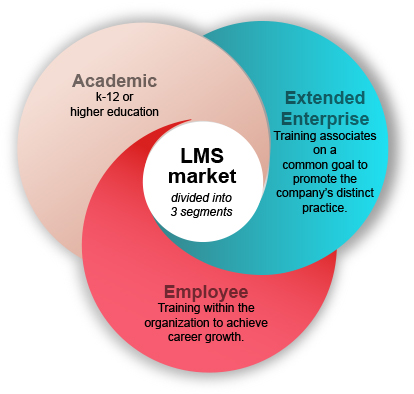
The LMS (Learning Management System) can be broken down into three segments. These segments are not equally divided among the industry but are essential, depending on the need of the end-user.
The three segments are
- Academic learning
- Employee training
- Extended enterprise training

Although academic training is an important piece of the LMS market, this article will focus on employee training vs. extended enterprise training.
Employee training is the training of an organization’s workforces. This can include HR policies such as sexual harassment courses, CPR courses, or diversity courses. It also includes training to enhance a person’s career growth. For instance, taking a course in Microsoft Excel or Adobe Photoshop benefits an employee in his or her role at the organization. The training is focused on the career.
Extended enterprise training is the training among associates or franchises. A good example is getting your usual hazelnut mocha at your regularly visited coffee shop. Now imagine you are out of town on business and see your favorite coffee shop in the hotel lobby. You would expect that your hazelnut mocha would taste, smell, and look the same, wouldn’t you? How is that possible? Extended enterprise training is the answer. Across the board, all associates of this coffee shop are trained to make your hazelnut mocha the same way with the same ingredients. The results are consistent products and services and, more importantly, happy customers.
What is the best fit for your organization? Extended enterprise training and employee training have distinct characteristics and differences.
Focus
- Extended enterprise training focuses primarily on training people on product, sales, and services. The best way to understand this is to take the franchise model:
Franchisor: Overall arching owner or controller
Franchisee: A person the franchisor has given the right to conduct business.
Franchise: the right to offer products or services under explicit guidelines of the franchisor.
Back to the coffee shop analogy, the focus is to make sure all baristas are trained properly on the new caramel mocha rather than career development of the barista.
- Employee training focuses on employee compliance training or employee career development.
Managers
- Extended enterprise training is managed by associate relationship managers or role-based managers. For instance, the franchise owner would oversee and manage the course enrollment and performance.
- Employee training generally is managed by Human Resource department managers.
Constituents
- In extended enterprise training, the student isn’t necessary known or identified. (The associate is known; the student is not.) For instance, a franchisor may want to launch a new course on the steps to make “Dirty Mochas” in all the coffee shops. The franchisor does not (necessarily) know the barista in Ann Arbor, MI, or Tallahassee, FL.
- In employee training, the student is defined as an employee; therefore, all employees are known to the employer.
Incentive
According to research analysis, there is a strong correlation between extended learning and associate performance. On the other hand, using incentives has proven to be weak for employee training and performance.
- Extended enterprise training tied to incentive program or certification: An incentive system that rewarded a barista an extra $25 per 100 cups of the ‘coffee of the month’ they sold each month would encourage them to offer customers the coffee of the month.
- Employee training usually is tied to the annual performance review.
Positional Reporting Relationship
- In extended enterprise training, it is not necessarily known. The manager at one coffee shop may be a barista at another and, therefore, their position isn’t easy identifiable.
- Employee training usually has a direct reporting hierarchy via the traditional business structure: Employee, Manager, Director, Vice President, President
Roles
- Extended enterprise training has multiple relationships to the network. A barista may work full time in one franchise and work a few hours on the weekends at another location within the same organization. Therefore, having multiple profiles at multiple organizations is essential for the barista’s role requirements they are representing at any particular coffee shop.
- Employee training usually has one role in one organization. The graphic designer isn’t also a salesman on the weekend.
Content
- Extended enterprise training needs to inform associates of their products and services through literature, social media, etc. It is vital that all associates are presented information to properly run the franchise.
- Employee training is largely HR policy content such as vacation, comp time, non-hostile work. environments.
Core to the Business
- Extended enterprise training trains people to do what is core or essential to the company’s main goal. They have very distinct practice as how the interaction achieves the mission. The training is focused on the product or company’s mission. For example, to sell coffee.
- Employee training is not necessarily core to the reason of the organization’s existence. The training often is focused on the career of the employee. An example would be to have all managers trained on sexual harassment to prevent a hostile work environment.
Extended enterprise training or employee training? The bottom line is simple: Are you training employees within the traditional normal business model or does your business model more reflect that of an extended enterprise or franchise?
Jeff Walter is an expert in extended enterprise training. Walter is the CEO of Latitude and has more than 25 years of experience building software practices in the franchise, manufacturing, health-care, insurance, and financial services sectors. Latitude is a technology-first organization that drives extended enterprise performance for the largest of the Fortune 500 to the leading middle-market firms.




